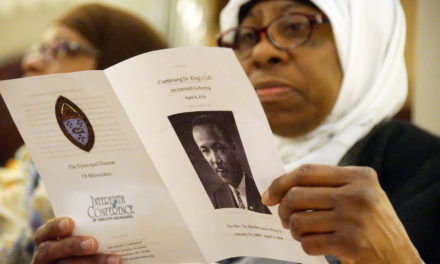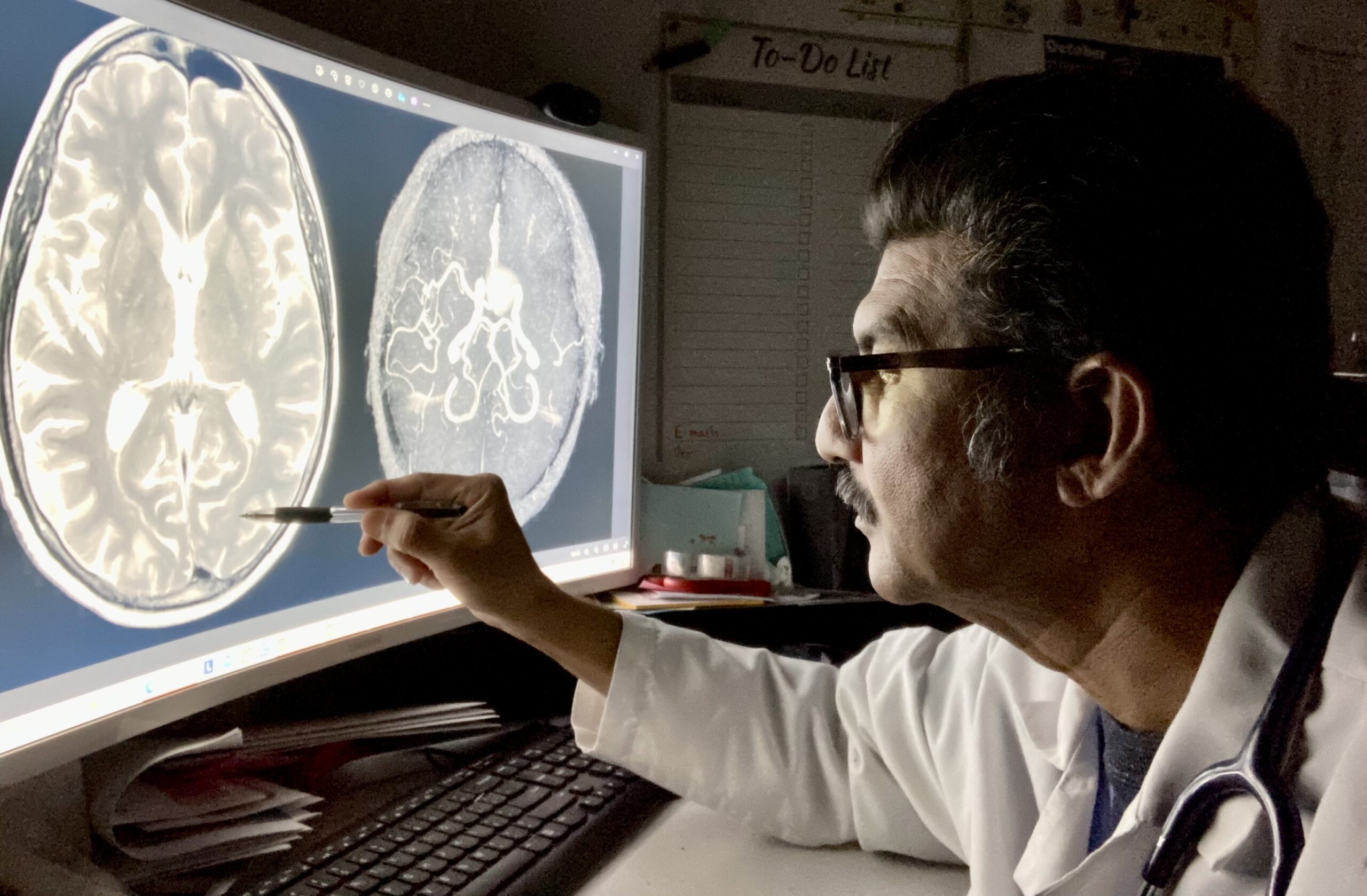
Photo courtesy of Abbas Ali, M.D.
Abbas Ali, M.D., of Mequon, a board-certified physician with three specialties, critical care, pulmonary medicine and sleep medicine, researches neuroscience to share tips with fellow doctors and community members on focus, alertness and attention.
When Abbas Ali, M.D., of Mequon began researching neuroscience and sharing scientific information about maintaining focus and attention, some of his fellow physicians asked why a physician certified in critical care, pulmonary and sleep medicine delved into the workings of the brain.
His answer is both professional and personal.
“As a physician, especially one working in the intensive care unit, where we have all at times suffered from sleep deprivation and burnout, learning to maintain our focus on the care of each patient is so important,” Dr. Ali told Wisconsin Muslim Journal in an interview this week.
“If a neurosurgeon loses focus for one moment during surgery or a pilot for one moment during landing, you know the consequences. For me, in the intensive care unit, where moment-to-moment monitoring of patients can mean life or death, learning how to stay alert and attentive is key,” he explained.
In his personal life, he applied the principles of focus to his prayers and realized it gave him a deeper, more meaningful experience.
Learning to control one’s attention and be mindful during critical moments is an important survival skill for everyone, he said. It can enhance every area of your life.
Dr. Ali will share neuroscience-based tips on how to maintain focus and attention, and be fully present during daily activities, especially during religious prayer. The seminar will be held at 2 p.m. on Sunday, June 30, at the Islamic Resource Center, 5235 S. 27th St., Greenfield.
During the seminar, participants will learn the brain mechanisms behind mind wandering and techniques for deeper focus and connection. Anyone who wants to improve their focus, attention and alertness in prayer and all other areas of their lives will benefit from this information, as he has, Dr. Ali said.
This free seminar is open to the public. No registration is required.
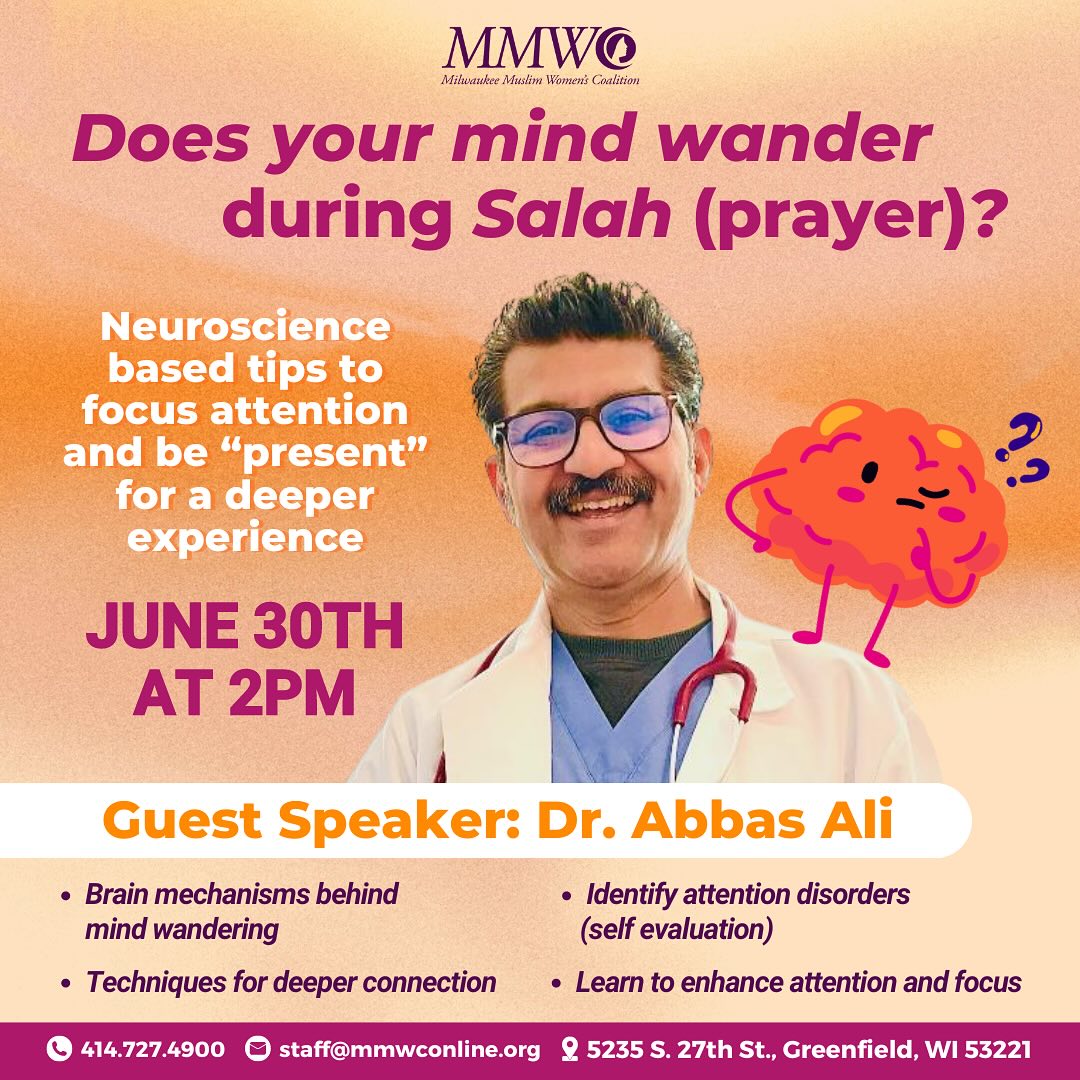
A preview of Learn to Focus Attention and Be Present, Tips from Neuroscience
WMJ asked Abbas Ali, M.D., what participants will learn at his June 30 seminar. Here’s what he had to say.
Who will benefit from this seminar?
Anyone who wants to learn how to be more fully present in each moment and to stay focused at work, in prayer, conversations with others and all areas of their lives.
It will be a scientific discussion about how the brain works and what techniques can be used to improve focus. One topic we will discuss is how Muslims can deepen their experience of prayer. The principles taught can be applied by people of all faiths to prayer and other activities.
Why do we need the ability to focus?
We do not multi-task. That is a myth.
Let me give you a real-life example. When someone is driving, they pay attention to the car ahead of them. When a message comes in on their phone, they look at their phone and maybe take a sip of coffee. During those activities, they are not focused on the car in front of them.
The human mind focuses on only one thing at a time. Instead of multi-tasking, our attention jumps from one focus to another and back.
Sometimes we experience “highway amnesia,” moments when we don’t know what happened in front of us because our mind jumped to the phone, a song playing or something else. Learning to maintain focus can save lives.
When we are able to focus, we become better people. We can train our brains to pay attention to the important things in life. In Islam and other faiths, we have the concept of the Shatan (Satan) that comes to us through thoughts. When we learn to focus on what is important, we can avoid dwelling on evil thoughts that may come to us.
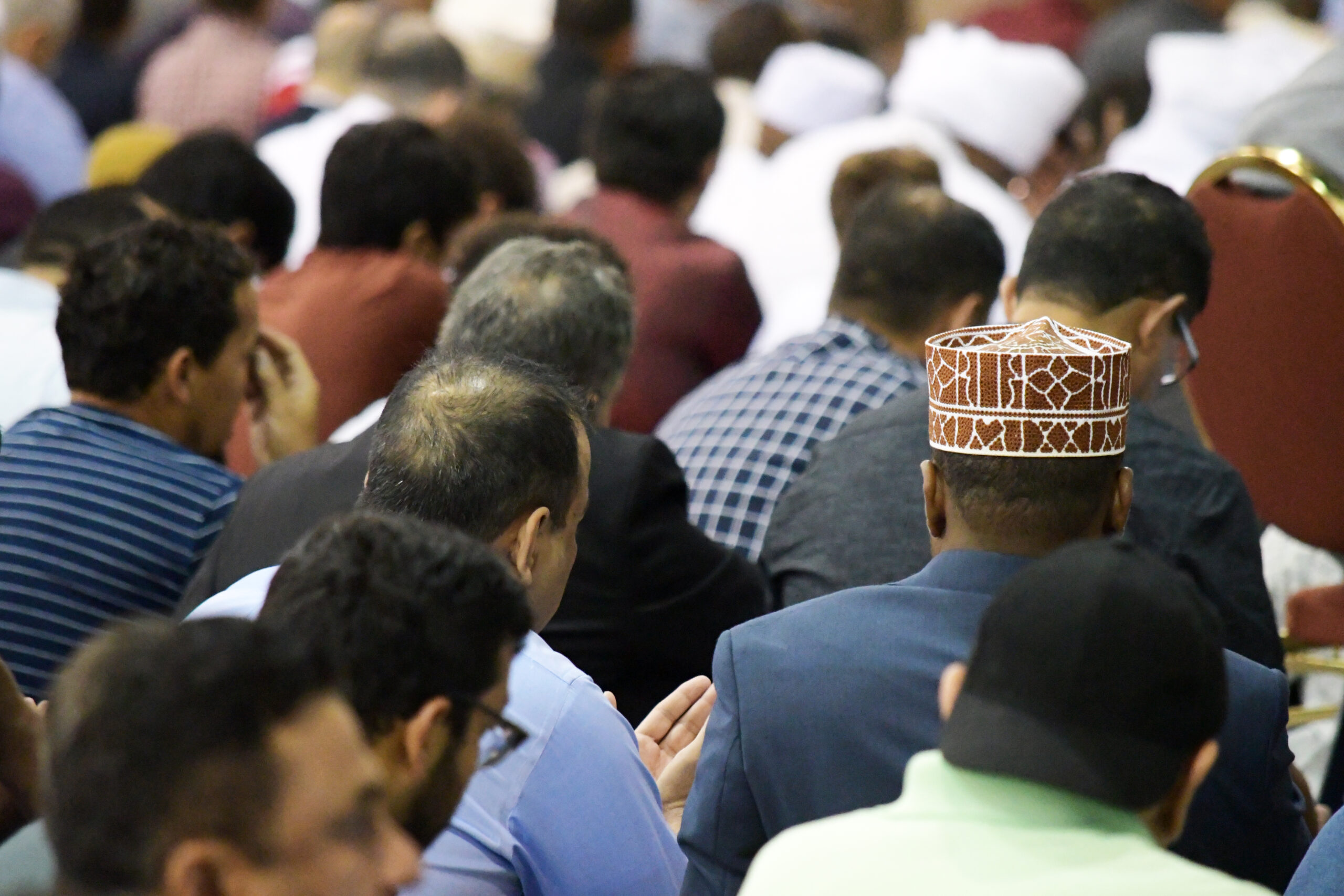
What led you to apply principles from neuroscience to prayer?
I have problems sometimes focusing on the prayers, depending on how my day is going and my level of stress. I expect many other community members experience the same thing.
Muslim prayer requires three steps:
- Interruption of the daily routine (five times a day)
- A physical act (bending and prostrating oneself)
- Disengagement from the external environment
Most of us do a good job of steps one and two. But, in most cases, Step 3 is missing.
A lot of research has been published in the past two decades, much of it in medical journals, about brain activity during prayer. Advanced radiology techniques and conventional EEG brain scans have been used. I will share some of those findings.
In general, they show that prayer without mindfulness is nothing more than a physical activity. That’s why the third step is very important. To experience a deep sense of connection in prayer, we must disengage from the environment.
To have a more meaningful experience of prayer, we need to improve the way we pray and improve our daily habits.
Why is it so difficult to keep our minds from wandering during prayer?
Humans experience a phenomenon no other living being can—time travel. In the blink of an eye, we can go back in time and think about what happened to us a decade ago. I can even jump into the future. We can worry about tomorrow or regret our past.
Unfortunately, most people spend most of their lives regretting the past or worrying about the future. To be in the present, we must learn to disengage from our regrets of the past and worries of the future. That is the state of mind we need to be in during our prayers. My presentation will focus on how to achieve that goal.
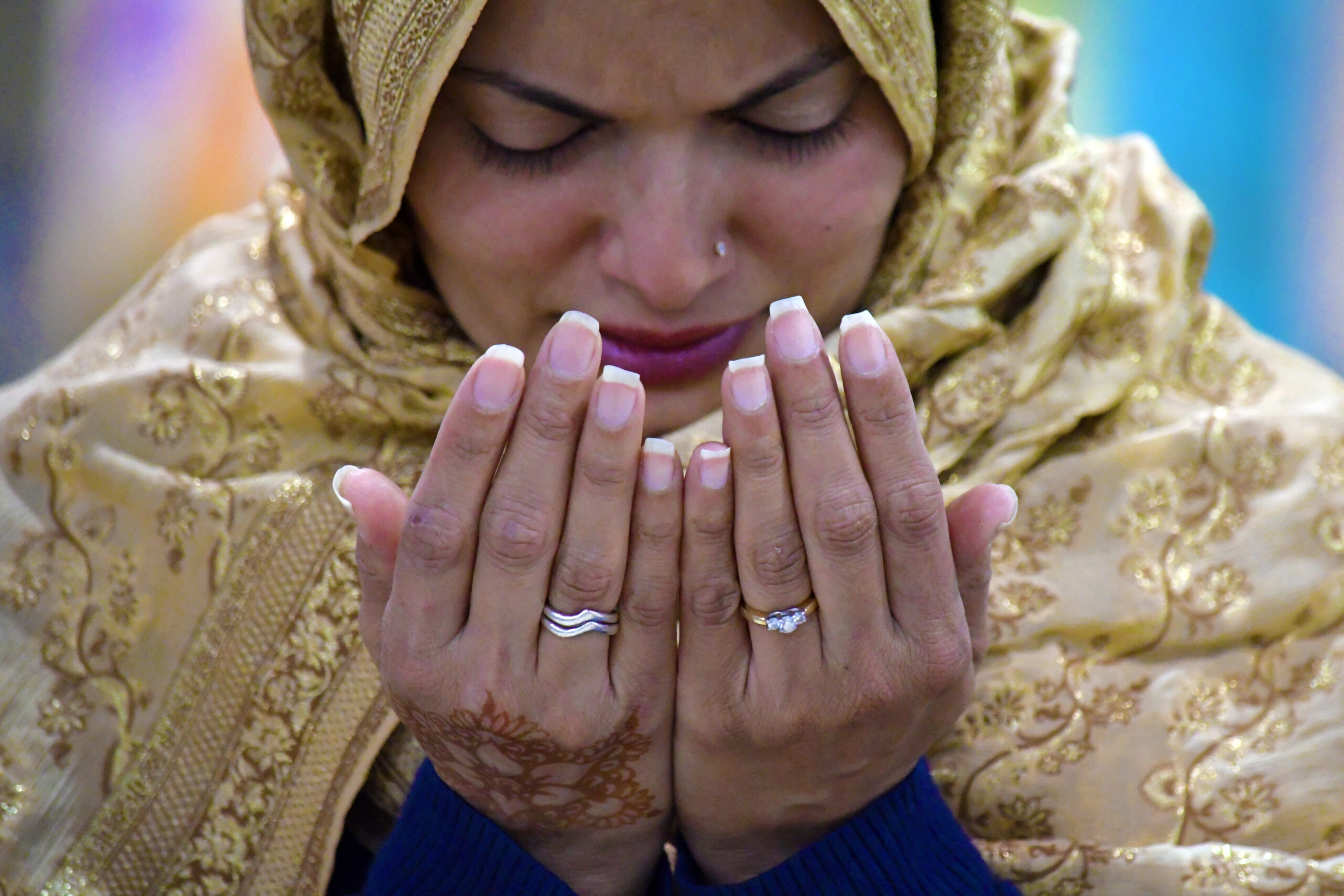
Photo by Lila Aryan
Why is it so hard to disengage?
We have so much in our environment and so much in our brains to distract us. Information comes to our brains from hundreds of sources at the same time.
Our brain cannot process all that information so nature has provided a tool—attention. We are able to ignore everything going on in our lives and focus on the important things that matter in that moment.
Salah (prayer) offers a mindfulness exercise. It teaches us to disengage from everything around us to be present in the moment. Just as in a computer search, in prayer we filter out unnecessary information and focus only on what is important.
Sometimes physical factors play a role, like in Ramadan when people fast from food and drink all day and pray during the night. Hunger and sleep deprivation can make it hard to focus during prayer.
We will talk about how to control physical factors in our daily lives by sleeping at appropriate times, being out in natural sunlight and limiting exposure to artificial light.
There may be distractions in the place we pray. We need a place where there’s minimum movement in our peripheral field of vision, which is very sensitive to motion. Someone passing can easily distract us. At one of the hospitals where I work, I discovered a room for prayer near the back door of the building. Few people go back there and there is minimal movement. I find myself more focused when I pray there.
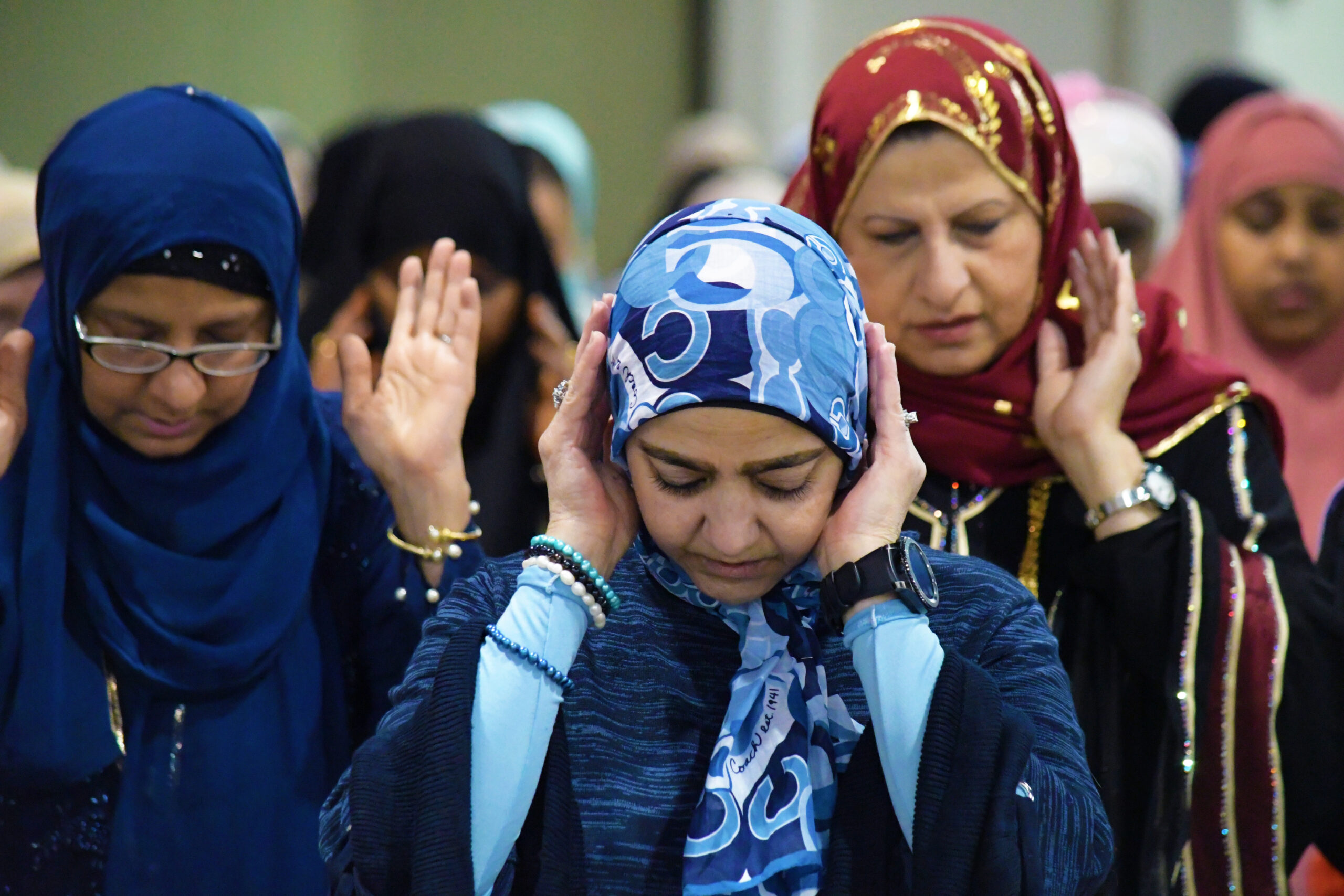
Photo by Lila Aryan
What are some techniques to develop our attention that you will share?
The most important step is visualization. We cannot focus on anything unless we visualize it. Mental or cognitive focus always follows visual focus.
During prayer, we may visualize something that reminds of the glory of God like the Ka’aba in Mecca. Having that focal point helps keep your mind from moving to what is happening in the room or on the television.
Mindfulness exercises are other techniques that help us be in the present. I will discuss some of these.
Another thing that has helped me personally is to make a daily to-do list. One reason our minds wander is because we have so many tasks we must do each day. Most of the time, our minds go back to the multiple tasks of the day because we don’t want to forget something important. When I create a wish list of what I want to do before the end of the workday, my mind will be at peace, knowing I’m not going to miss anything.
I also set aside a daily worry time and postpone all worries to that designated time. When something enters my mind that makes me worry, I jot it down and go back to it at 5 or 6 p.m., whatever time I have designated for worrying. That keeps the mind clear of clutter. We cannot resolve all issues on the spot. We need to give ourselves time for rational thinking.
Muslim prayer also helps me organize my day in ways that help me maintain focus and attention. It divides the day into five segments. Just like tabs on files, I give each segment its topic of focus. By knowing our own biological clocks, we will discover our times of alertness and use those wakeful times to be productive. Developing a daily routine provides the structure we need to focus on what matters.
